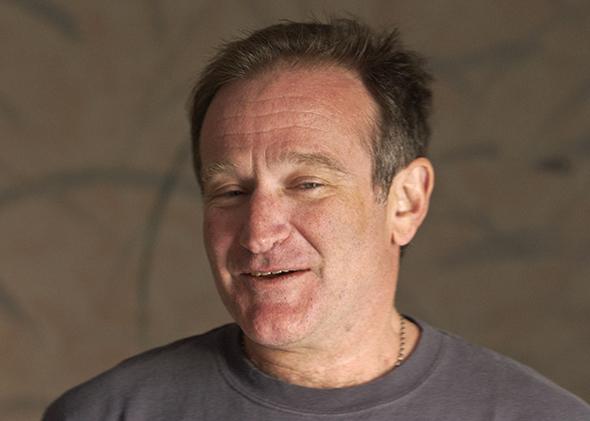I met Robin Williams once, in 1993, when I was a law school student. I had co-authored a book with Larry Berger and a bunch of kids: I Will Sing Life: Voices From the Hole in the Wall Gang Camp. This was a book about the poetry of seven campers from Paul Newman’s camp for terminally ill children in Connecticut. We were taping the audiobook, and Robin Williams, who adored Paul Newman, had agreed to record one of the chapters.
Of course, we all adored Paul Newman. I had met Newman in my years on the camp staff and spent much of my life being awed by him. But he always struck me as a regular guy who spent his days fully gobsmacked by what had happened to him and how lucky he had been. He paid it forward because he could never quite come to grips with having it all. Williams’ generosity that day had a different energy. Williams, who died Monday at 63, loved everything so hard it just hurt.
The recording studio in San Francisco was sunny, and Robin Williams was reading the trickiest chapter in the book. The seven campers each had a chapter, told in their own words and transcribed by me and Larry, their counselors. Each chapter was packed with poems and drawings and words, but Shawn Valdez’s chapter was all about the voices of his family and his imaginary friends and it required a deft reader. This was a 7-year-old, dying of T-cell leukemia, whose world was peopled with magical imaginary creatures and real members of the oncology establishment and he wanted each of them to be heard in his chapter and so he wrote it that way.
Robin Williams did all the voices, all of them. Ranging from the tiny breathy narration of tiny Shawn himself, to the voice of his mom, whose Spanish accent Williams replicated so perfectly that I kept wondering if she had coached him on the way over. Except that she lived in Florida. He nailed everyone in the chapter, from Paula, the beautiful, soulful healer who understood Shawn better than any of us, to the brisk oncologists who flitted in and out of Shawn’s people-packed life.
That afternoon, I was briefly introduced to Williams and then dispatched to the other side of the glass in the recording booth, where I was allowed to sit and watch him inhabit each of these characters. It was the most electric, frantic, high-energy few hours I have ever spent in my life. The whole performance—as he read, and then hit his mental delete key and reread, trying out voices of people he didn’t know and yet capturing them completely—was unforgettable. I was aware that I was in the presence of a fantastic, once-in-a-lifetime talent who could not even for a moment settle down enough to breathe himself in. For the few minutes that he was himself, talking to me, he was this sweet gentle, big-hearted guy. But he was happiest doing the voices. And you see this quality in everything he ever did, including an interview about his history of addiction where he only really seems happy when he is doing the British, the French, and the Italians. That sunny day while I watched him read, he was overtaken almost completely by the people he met, and the joy he packed into them—and into the characters he played—was, in some way, stolen from himself.
That day, Robin Williams did all the voices, read all of the paragraphs, read them again, and channeled every character in the chapter, flawlessly and without taking breaks. He just sat there and read the words Shawn wrote, and it was as if he were speaking them and the words as written were almost unnecessary. For days after I met him I was exhausted; totally depleted. And I was also aware that there was no filter, no membrane at all between Robin Williams and the rest of the world; and of what it must have cost him to so fully inhabit so many people—including a dying child he would never meet but to whom he had pledged to give voice. All I could think was how very hard it must have been to take a leave of absence from himself to do that, every day, and how hard it must have been—having done that—to find something to come home to.
Depression is a harrowing and ultimately gutting disease and Robin Williams was open about his struggle. I want to thank him for what he did for Shawn Valdez, for the Hole in the Wall Gang Camp, and for all of us who benefitted from his generosity with his talents. Mostly I wish that his lifetime of sharing himself with us had somehow nourished him as much as it fed us all.
